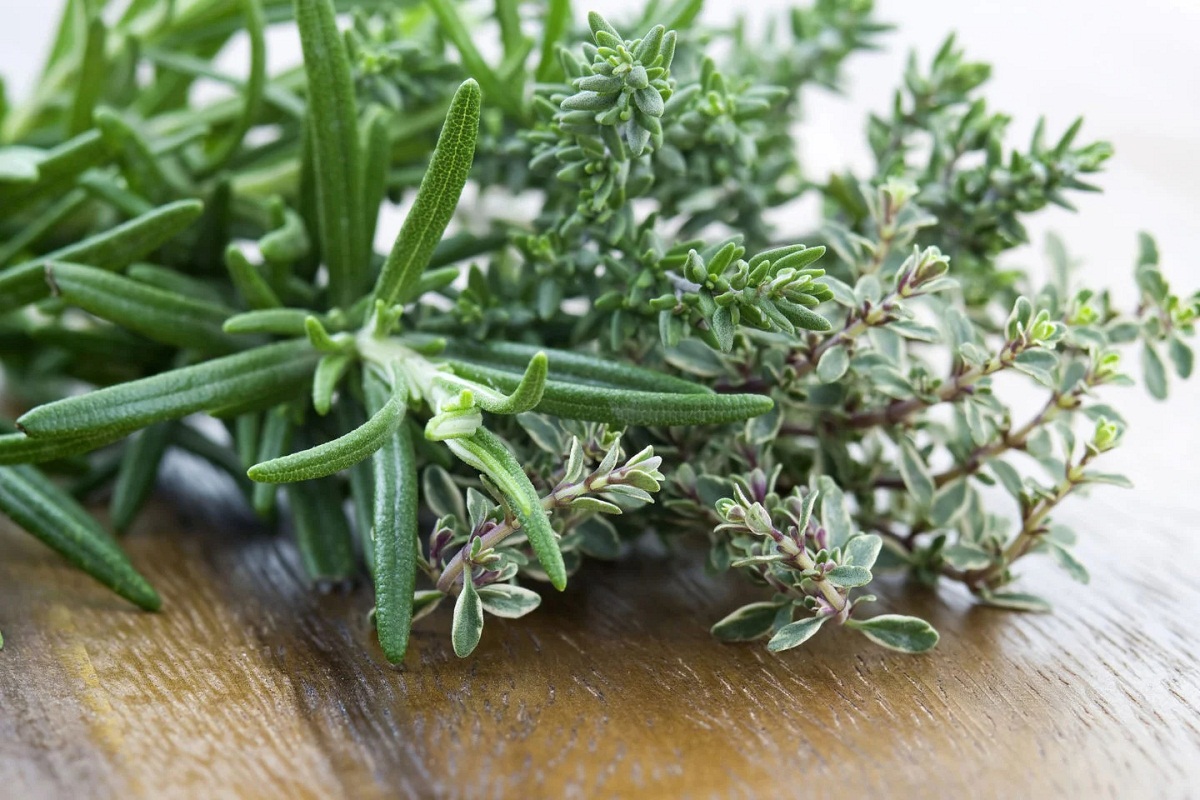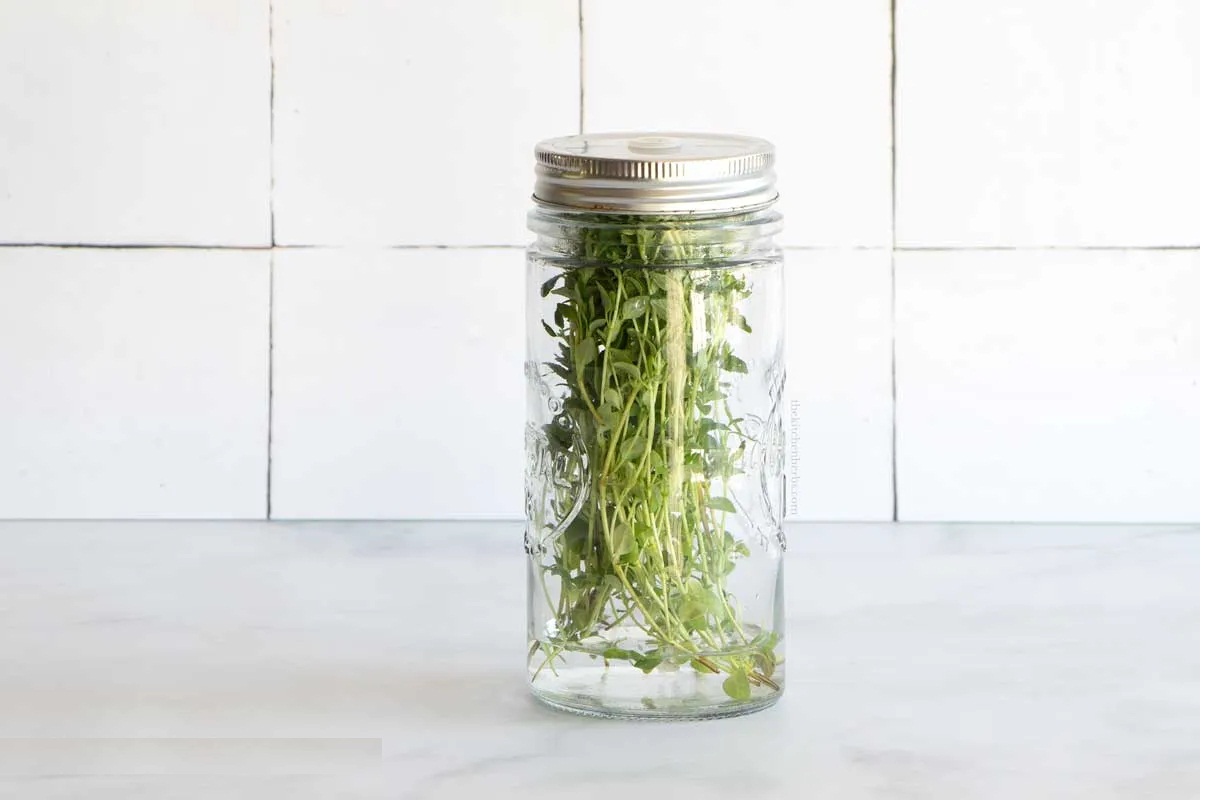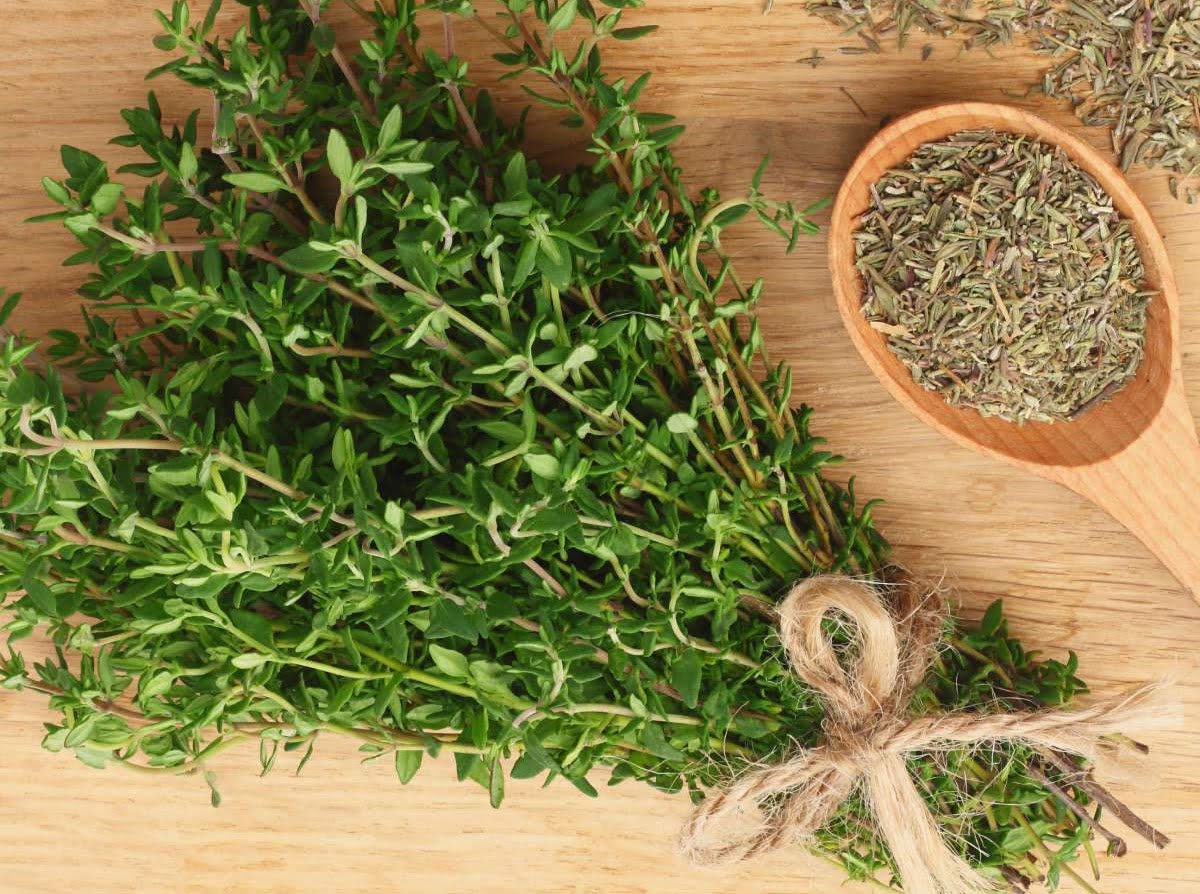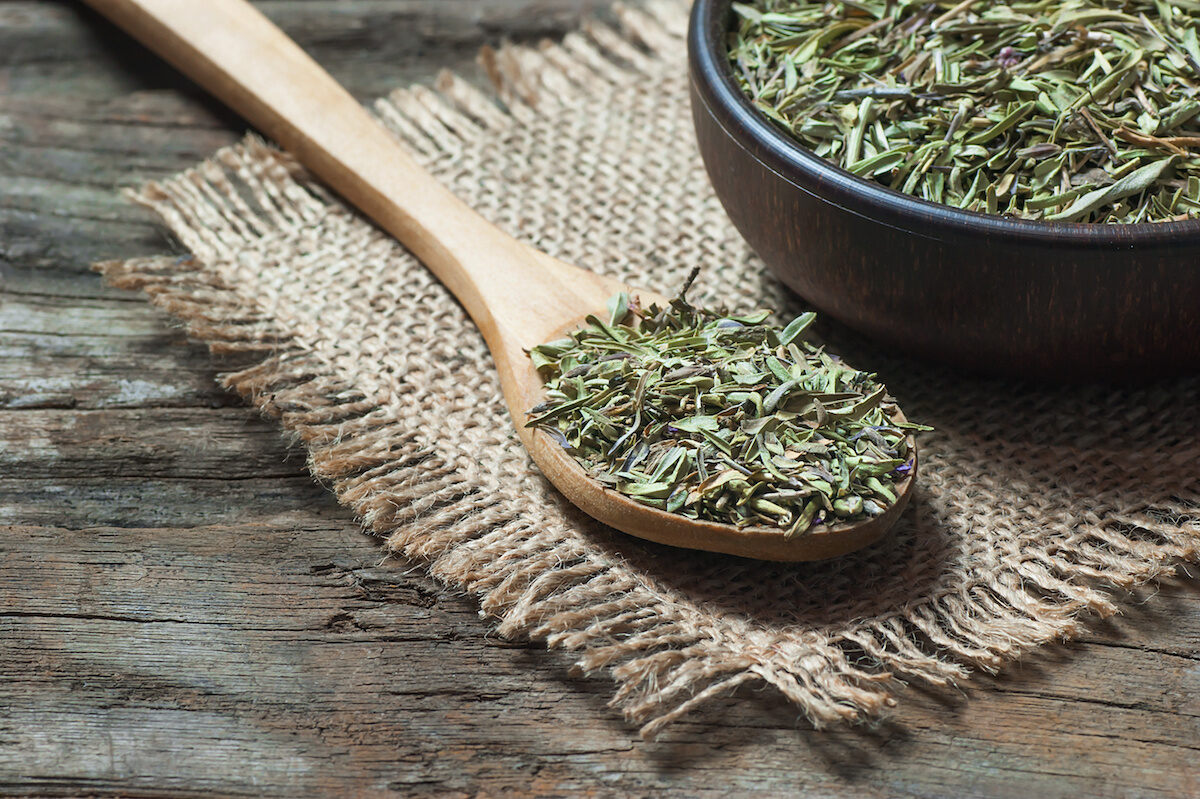Home>Garden Essentials>Garden Plants>What To Do With Fresh Thyme And Rosemary


Garden Plants
What To Do With Fresh Thyme And Rosemary
Modified: August 22, 2024
Discover creative recipes and uses for fresh thyme and rosemary plants that will add aromatic flavors to your culinary creations.
(Many of the links in this article redirect to a specific reviewed product. Your purchase of these products through affiliate links helps to generate commission for Storables.com, at no extra cost. Learn more)
Introduction
Welcome to the wonderful world of fresh thyme and rosemary! These two herbs are not only aromatic and flavorful but also packed with a plethora of health benefits. Whether you’re a seasoned cook or a gardening enthusiast, incorporating fresh thyme and rosemary into your culinary adventures can elevate your dishes to new levels of deliciousness.
In this article, we’ll delve into the fascinating characteristics of fresh thyme and rosemary, explore their numerous benefits, and discover creative ways to use them in your cooking. We’ll also touch on some exciting homemade remedies and DIY projects that you can try, as well as techniques to store and preserve these herbs for long-lasting freshness. So, let’s begin this herbal journey and unlock the hidden potential of fresh thyme and rosemary!
Key Takeaways:
- Elevate your culinary creations with fresh thyme and rosemary, packed with antioxidants, anti-inflammatory properties, and immune-boosting benefits. Get creative with herb-infused butters, homemade remedies, and DIY projects for a vibrant culinary experience.
- Discover the versatile uses of fresh thyme and rosemary, from enhancing meat and poultry dishes to creating herbal remedies and DIY projects. Preserve their vibrant flavors through refrigeration, freezing, drying, and infusing oils and vinegars for year-round enjoyment.
Read more: How To Store Fresh Rosemary And Thyme
Understanding Fresh Thyme and Rosemary
Thyme and rosemary are two well-known herbs that have been used for centuries in culinary and medicinal practices. Let’s take a closer look at each herb individually:
Fresh Thyme
Thyme, scientifically known as Thymus vulgaris, is a small perennial herb that belongs to the mint family. It is native to the Mediterranean region and is renowned for its aromatic leaves and delicate flowers.
Thyme comes in various varieties, including common thyme, lemon thyme, and English thyme, each with its distinct flavor profile and culinary uses. The leaves of thyme are small and narrow, with a slightly earthy and minty taste.
In addition to its culinary applications, thyme has been traditionally used in natural medicine for its antimicrobial and antiseptic properties. It is also rich in essential minerals and vitamins, such as vitamin C and vitamin A.
Fresh Rosemary
Rosemary, scientifically known as Rosmarinus officinalis, is an evergreen shrub that is native to the Mediterranean and is part of the mint family. It is characterized by its needle-like leaves and fragrant aroma, reminiscent of pine and citrus.
Known for its strong and distinctive flavor, rosemary is a versatile herb that adds depth and complexity to a wide range of dishes. Its leaves are often used to flavor meats, soups, stews, and roasted vegetables.
Besides its culinary uses, rosemary has been treasured throughout history for its medicinal properties. It is an excellent source of antioxidants and has been associated with improved digestion, enhanced memory, and reduced inflammation.
Both thyme and rosemary are easy to grow in a home garden or in pots, making them accessible for anyone who wants to enjoy fresh herbs in their cooking. The vibrant aroma and unique flavors of these herbs elevate both simple everyday meals and elaborate gourmet creations.
Now that we have a better understanding of fresh thyme and rosemary, let’s explore the many benefits they offer and how you can incorporate them into your culinary creations.
Benefits of Fresh Thyme and Rosemary
Fresh thyme and rosemary not only add incredible flavor to your dishes but also provide a range of health benefits. Let’s dive into some of the key advantages these herbs offer:
1. Rich in Antioxidants
Thyme and rosemary are both packed with antioxidants that help protect against cellular damage caused by free radicals. These antioxidants have been linked to reducing the risk of chronic diseases, including heart disease and certain types of cancer.
2. Anti-Inflammatory Properties
Both thyme and rosemary contain compounds with anti-inflammatory properties, such as rosmarinic acid and thymol, which can help reduce inflammation in the body. This makes them beneficial for individuals with conditions like arthritis or inflammatory bowel disease.
3. Digestive Aid
Thyme and rosemary have traditionally been used as digestive aids due to their ability to stimulate the production of digestive enzymes. These herbs can help alleviate indigestion, bloating, and abdominal discomfort.
4. Boosts Immune System
The high concentration of vitamin C in thyme can help strengthen the immune system and protect against infections. Rosemary, on the other hand, contains compounds that have been shown to enhance immune function, offering increased protection against pathogens.
Read more: How To Freeze Thyme And Rosemary
5. Cognitive Support
Research suggests that the compounds found in rosemary may have cognitive benefits, including enhancing memory and improving concentration. Inhaling the aroma of rosemary has been shown to stimulate brain activity and boost cognitive performance.
6. Respiratory Health
Both thyme and rosemary have properties that can support respiratory health. The essential oils in these herbs have been traditionally used to alleviate coughs, congestion, and asthma symptoms.
These are just a few of the many health benefits fresh thyme and rosemary have to offer. By incorporating these herbs into your cooking, you not only enhance the taste of your food but also promote overall well-being. Now that we understand the benefits, let’s explore the versatile culinary uses of fresh thyme and rosemary.
Popular Culinary Uses of Fresh Thyme and Rosemary
Fresh thyme and rosemary bring a burst of flavor and aroma to a wide range of dishes. From savory to sweet, these herbs can elevate your culinary creations to new heights. Here are some popular culinary uses for fresh thyme and rosemary:
1. Meat and Poultry
Thyme and rosemary pair exceptionally well with meat and poultry dishes. Whether you’re roasting a chicken, grilling a steak, or marinating lamb, these herbs add depth and fragrance. Sprinkle them over your meat before cooking, or create herb-infused marinades for succulent and flavorful results.
Read more: How To Store Fresh Rosemary In The Freezer
2. Soups and Stews
Thyme and rosemary are commonly used in soups and stews to infuse them with a savory and aromatic note. Sprinkle a few sprigs of thyme or a handful of rosemary leaves into your pot of simmering broth for a fragrant and comforting bowl of goodness.
3. Roasted Vegetables
Roasting vegetables brings out their natural sweetness, and thyme and rosemary are the perfect companions to enhance their flavors. Toss your favorite vegetables with olive oil, chopped herbs, and some salt and pepper, then roast them to perfection. The result is a side dish that is both vibrant and incredibly delicious.
4. Pasta and Rice Dishes
Infuse your pasta and rice dishes with the flavors of thyme and rosemary. Add a sprinkle of fresh thyme leaves to your pasta sauce or stir-fry, or toss cooked rice with chopped rosemary for a fragrant and savory side dish.
5. Breads and Baked Goods
Thyme and rosemary can also take your homemade breads and baked goods to a whole new level. Incorporate chopped rosemary into your bread dough for a unique and aromatic twist. Sprinkle thyme leaves on top of your focaccia or savory scones for added flavor and visual appeal.
Read more: How To Clean Fresh Thyme
6. Infused Oils and Vinegars
Make your own infused oils and vinegars with fresh thyme and rosemary. Simply add a few sprigs of your chosen herb to a bottle of olive oil or vinegar and let it infuse for a few weeks. The resulting flavored oils and vinegars can be used as dressings, marinades, or for dipping bread.
These are just a few examples of how you can incorporate fresh thyme and rosemary into your culinary creations. Don’t be afraid to experiment and explore the unique flavors and aromas these herbs have to offer. Now let’s move on to some creative ways to incorporate fresh thyme and rosemary in your dishes.
Creative Ways to Incorporate Fresh Thyme and Rosemary in Your Dishes
While fresh thyme and rosemary can be used in various traditional recipes, there are also plenty of creative ways to incorporate them into your dishes. Let’s explore some innovative ways to utilize these herbs:
1. Herb-infused Butter
Blend softened butter with finely chopped fresh thyme and rosemary to create a flavorful herb-infused butter. Spread it on bread, melt it over grilled vegetables, or use it to baste meat and fish for a delightful burst of herbaceous goodness.
2. Herbal Seasoning Blends
Create your own herbal seasoning blends by mixing dried thyme and rosemary with other complementary spices like garlic powder, onion powder, and paprika. Use these blends to season roasted potatoes, grilled meats, or sprinkle on popcorn for a unique twist.
Read more: How To Store Fresh Thyme
3. Herbed Salt or Sugar
Make your own herbed salt or sugar by finely chopping fresh thyme or rosemary and mixing it with salt or sugar. The aromatic flavors will infuse into the seasoning, adding a delightful twist to your sweet or savory dishes.
4. Homemade Herb-infused Vinegars
Infuse white wine or apple cider vinegar with sprigs of fresh thyme and rosemary for a homemade herb-infused vinegar. Use it in salad dressings, marinades, or drizzle it over roasted vegetables for a tangy and herbaceous kick.
5. Herbal Simple Syrups
Create herbal simple syrups by simmering fresh thyme or rosemary with sugar and water. Use these flavored syrups in cocktails, mocktails, or drizzle them over desserts like cakes and fruit salads for a burst of herbal sweetness.
6. Infused Honey
Combine fresh thyme or rosemary with honey to create a unique infused honey. Allow the herbs to steep in the honey for a few weeks, and then use this herbal honey as a sweetener for tea, drizzle it over yogurt, or use it as a glaze for roasted meats.
Get creative in the kitchen and experiment with these innovative ideas to incorporate fresh thyme and rosemary into your dishes. The possibilities are endless, and these herbs can add a whole new dimension of flavor to your culinary creations.
Now, let’s explore some homemade remedies and DIY projects that you can try with fresh thyme and rosemary.
Read more: How To Prepare Fresh Thyme
Homemade Remedies and DIY Projects with Fresh Thyme and Rosemary
Aside from their culinary uses, fresh thyme and rosemary have long been valued for their medicinal properties. Here are some homemade remedies and DIY projects you can try with these herbs:
1. Therapeutic Herbal Tea
Brew a soothing and rejuvenating herbal tea by steeping fresh thyme or rosemary in hot water. These herbs are known for their calming properties and can help alleviate stress and promote relaxation. Add a hint of honey and a squeeze of lemon for added flavor.
2. Herbal Hair Rinse
Infuse fresh rosemary in boiling water, then strain the liquid and use it as a hair rinse after shampooing. Rosemary has been used for centuries as a natural remedy for promoting hair growth, improving scalp health, and reducing dandruff.
3. Aromatherapy Steam Inhalation
To clear congested sinuses and alleviate respiratory issues, steep fresh thyme in a bowl of hot water and inhale the steam by placing a towel over your head. The aromatic vapors can help relieve congestion and promote easier breathing.
Read more: How To Use Fresh Thyme
4. Herbal Bath Soak
Create a luxurious and therapeutic herbal bath by tying fresh thyme or rosemary sprigs in a muslin cloth and adding them to your bathwater. The aromatic oils released by these herbs can help relax muscles, soothe the mind, and promote overall well-being.
5. Scented Herb Sachets
Make fragrant herb sachets by filling small fabric bags with dried thyme or rosemary. Place these sachets in your drawers, closets, or even under your pillow, as the natural scents of these herbs can have a calming and refreshing effect.
6. All-Purpose Herbal Cleaner
Create a natural and fragrant all-purpose cleaner by infusing white vinegar with fresh thyme or rosemary. Allow the herbs to steep in the vinegar for a few weeks, then strain the liquid and use it for cleaning countertops, floors, and other surfaces.
These homemade remedies and DIY projects allow you to harness the natural properties of fresh thyme and rosemary for your health and well-being. Explore these ideas and discover the incredible benefits these herbs can offer beyond the kitchen.
Now, let’s move on to some tips on storing and preserving fresh thyme and rosemary.
Storing and Preserving Fresh Thyme and Rosemary
To fully enjoy the flavors and benefits of fresh thyme and rosemary, it’s essential to properly store and preserve them. Here are some tips to help you keep these herbs fresh for as long as possible:
Read more: How To Freeze Fresh Thyme
1. Refrigeration
To maximize the shelf life of fresh thyme and rosemary, it’s best to store them in the refrigerator. Wrap the herbs loosely in a damp paper towel and place them in a plastic bag or an airtight container. This will help retain moisture and keep the herbs crisp for up to two weeks.
2. Freezing
If you have an abundance of fresh thyme and rosemary, freezing them is an excellent way to preserve their flavors. Remove the leaves from the stems, place them in an ice cube tray, and fill each compartment with water or olive oil. Once frozen, transfer the herb cubes to a freezer bag and use them as needed in your recipes.
3. Drying
Drying is another method of preserving fresh thyme and rosemary. Gather small bunches of the herbs and tie them with twine. Hang the bundles upside down in a cool and well-ventilated area, away from direct sunlight. Once dry, remove the leaves from the stems and store them in an airtight container for future use.
4. Herb-infused Oils and Vinegars
Another way to preserve the flavors of fresh thyme and rosemary is by infusing them in oils or vinegars. Fill a clean glass jar with the herbs and cover them completely with oil or vinegar. Seal the jar tightly and let it steep for several weeks. The resulting infused oil or vinegar can be strained and used in cooking or as a dressing.
Read more: What To Do With Extra Thyme
5. Herb Butter or Compound Butter
Make herb butter or compound butter with fresh thyme and rosemary. Blend softened butter with the chopped herbs, then roll it into a log using plastic wrap. Refrigerate or freeze the herb butter and slice off portions as needed to enhance your dishes with the flavors of the herbs.
By following these storage and preservation techniques, you can extend the freshness of fresh thyme and rosemary, ensuring you always have these delightful herbs on hand for your culinary adventures.
Now that we’ve explored the benefits, culinary uses, and preservation methods for fresh thyme and rosemary, you can confidently incorporate these herbs into your cooking with ease.
Conclusion
Fresh thyme and rosemary are not just ordinary herbs; they are flavor powerhouses that can elevate your culinary creations to new heights. Their aromatic profiles, versatile uses, and numerous health benefits make them a must-have in any kitchen or garden.
Whether you’re adding a sprinkle of thyme to your roasted vegetables, infusing rosemary in a homemade bread, or enjoying a relaxing cup of herb-infused tea, these herbs bring a touch of freshness and vibrancy to your dishes and daily routines.
Beyond their culinary uses, thyme and rosemary offer a range of health benefits. They are rich in antioxidants, have anti-inflammatory properties, support digestion, boost the immune system, and contribute to cognitive health. Incorporating these herbs into your diet can enhance your well-being in more ways than one.
Moreover, fresh thyme and rosemary lend themselves to creativity, allowing you to experiment with herb-infused butters, homemade remedies, DIY projects, and more. The possibilities are endless, and these herbs are versatile enough to blend seamlessly into a variety of recipes and projects.
By properly storing and preserving these herbs, you can enjoy their flavors and benefits for an extended period. Whether refrigerating, freezing, drying, or using them to infuse oils and vinegars, you can ensure that the vibrant taste of fresh thyme and rosemary remains accessible year-round.
So, whether you’re a seasoned cook or a novice in the kitchen, don’t hesitate to explore the incredible world of fresh thyme and rosemary. Let their fragrances sweep you away, their flavors tantalize your taste buds, and their health benefits enrich your well-being.
Embrace the aromatic allure and versatility of fresh thyme and rosemary, and unlock the secrets hidden within these incredible herbs. Your culinary adventures will never be the same again.
Frequently Asked Questions about What To Do With Fresh Thyme And Rosemary
Was this page helpful?
At Storables.com, we guarantee accurate and reliable information. Our content, validated by Expert Board Contributors, is crafted following stringent Editorial Policies. We're committed to providing you with well-researched, expert-backed insights for all your informational needs.







0 thoughts on “What To Do With Fresh Thyme And Rosemary”